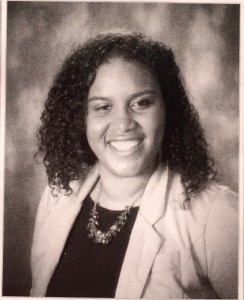Nikkita McPherson ’13
Nikkita McPherson, Class of 2013, never called Dartmouth her home. For Nikkita, home has and always been the South Bronx where she grew up with her mother. When she was deciding which college to attend, Nikkita looked for community. Five students who had also gone to her high school, Frederick Douglass Academy, were at Dartmouth, thriving. Nikkita found comfort in knowing she would have them as a community to support her.
During her first visit to campus, two aspects of Dartmouth stood out to Nikkita: whiteness and academic rigor. When she saw her hosts staying up all night to complete extra credit for one of their classes, she knew Dartmouth would be challenging academically. She did not know, however, that she would constantly regret her decision to attend the College on the hill. During her time at Dartmouth, Nikkita struggled academically, her need to work to pay for school further exacerbating her difficulties. Additionally, she faced challenges socially, realizing what racism was and how it manifested itself throughout various experiences over her four years. Despite these trials, Nikkita stayed in school, partly to make her mother proud and partly because she had worked too hard to give up. Her time at Dartmouth, while not easy, was a time of development for Nikkita.
When asked to recount a story that symbolizes what Dartmouth means to her, Nikkita talks about conquering her swim test during her senior spring.
When I had to take my swim test, it was the last possible day to take it. I had failed it at least once before. While I was taking my swim test, no one else was there. The only person that was there was the white lifeguard, a white male lifeguard. It just so happened that nobody else was there. They were offering for me to take the swim test where the pool was like ten feet deep or something.
I said, “No.” I was not a great swimmer. I was scared. I had almost drowned before as a teenager twice, so I was very much terrified of water.
The lifeguard was nice enough. He said, “I’ll come with you and we’ll take it in the pool, the shallow end.”
I started swimming and would not stop. I almost banged my head against the wall because I wanted to make sure that I passed the swim test because I couldn’t graduate otherwise. The reason that story is the one that comes to mind is because it literally sums up a lot of what Dartmouth was like for me. The fact that I couldn’t jump into the deep end so quickly because I wasn’t prepared. I was terrified from past experiences, which is very much what I went to Dartmouth with. Past experiences and traumas that I hadn’t dealt with. Not being ready to deal with them, so not being ready to jump into the deep end. Then having to compete by myself. A lot of the people I knew were passing their swim tests in the deep end section but I had to be by myself in the shallow end to ensure that I had that comfort of knowing that I could stand up at any time. Then while I was swimming, putting everything I had into it to the point where I almost caused myself pain by banging my head into the wall.
In the midst of a college where she felt ostracized, Nikkita came to a new understanding of who she was as Black and as woman.
When I got to Dartmouth, I identified as a Jamaican woman. Period. I refused to be acknowledged as Black. I refused to allow anyone to describe me as Black. I laughed when somebody said I was Dominican, but if you called me Black I was quick to correct you and tell you I was Jamaican.
Over time, I started to really realize that I was Black. I came to that realization mostly junior winter when I was at UCSD, which has less than a two percent population of Black people. This girl checked me in front of the whole Black Student Union, which is a tightknit community because it’s only less than two percent of them out of over 40,000 people. Before that moment, I was being called all types of nigga, jezebel, sapphire… all these things, but I still refused to say I was Black. And it was in that moment, when I was at UCSD and I went to the ABC Conference that they have every year, all the UCSD schools, that I started to really realize: I am a Black woman. I am of a legacy of brilliance and struggle. Why have I been trying to escape that for so long?
And then, which is interesting, I started to realize I was Black and woman my senior year, especially in dealing with old BADA people, the BADA men. They were very dismissive of me. They treated me like I was invisible during the 40th Anniversary of BADA. It really helped me realize, the fact that they dismissed that I was trying to gain BADA’s support in realizing that we were dealing with a lot of racism and verbal and physical acts of violence on campus. They were like, “Well, we dealt with worse.” They were dismissive of me and they were not talking to me. Then I realized that when a Black man would say something, that’s when they were listening.
Now, Nikkita teaches Global History and Geography to students in the South Bronx. She hopes to transition into a position that will allow her to develop curriculum focusing on youth identity development and leadership. She firmly believes that the youth will be the ones to take charge in fighting for liberation.
